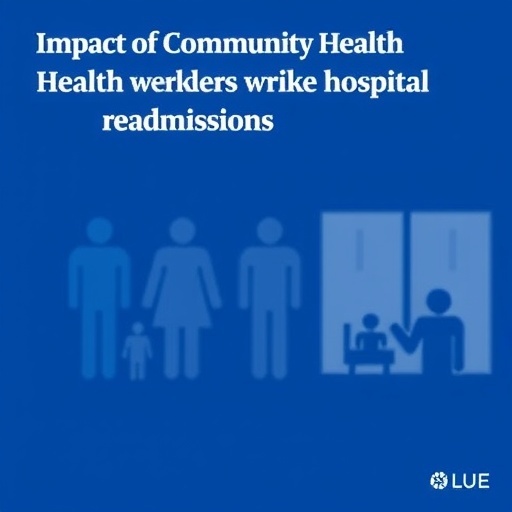In a groundbreaking study published in the Journal of General Internal Medicine, researchers C.E. Loftis, Cervantes, and L. Caplan have delved into the impactful role of Community Health Workers (CHWs) in reducing the rates of hospital readmissions. The meta-analysis revealed significant insights over a range of peer-reviewed studies, highlighting that the integration of CHWs into healthcare systems can dramatically influence patient outcomes. By focusing on the 30-day readmission rate, this research responds to a pressing need within health systems to optimize care continuity and improve patient satisfaction.
The study’s context is rooted in the broader challenge of hospital readmissions, which have become a focal point for healthcare policymakers aiming to reduce costs while improving quality in patient care. Hospital readmissions impose substantial financial burdens on healthcare systems and indicate potential deficiencies in post-discharge care management. The 30-day window captures a critical period where patients return to acute care settings, often forcing hospitals to examine their follow-up processes. By introducing CHWs, hospitals may enhance continuity of care after discharge, though the effectiveness of this approach required extensive examination.
In analyzing various studies involving CHWs, the meta-analysis meticulously compiled data from numerous clinical trials conducted across diverse healthcare settings. The authors examined variables such as patient demographics, types of interventions provided by CHWs, and the specific outcomes measured. Notably, the studies included in this analysis spanned a range of chronic health conditions, such as heart failure, diabetes, and respiratory diseases, allowing for a holistic understanding of how CHWs operate within different frameworks.
The CHWs in these studies are often involved in a variety of functions that go beyond simple health education. They facilitate connections between patients and healthcare services, provide resources for navigating complex health systems, assist in medication management, and support patients in adopting healthier lifestyles. The meta-analysis emphasizes that CHWs serve not just as liaisons but also as integral health actors who can potentially mitigate the risk factors associated with readmissions. This multi-faceted role places CHWs at the forefront of delivering culturally competent care tailored to the unique needs of diverse populations.
One of the significant findings of the meta-analysis is the clear correlation between CHW engagement and reduced hospital readmission rates. The data indicates that facilities utilizing CHWs saw a marked decrease in the 30-day readmission rates compared to those that did not. This finding reaffirms the hypothesis that improved patient education, better understanding of health conditions, and timely follow-up can lead to better health outcomes and lower chances of requiring hospital care shortly after discharge.
Moreover, the study underscores how CHWs can bridge gaps in healthcare, particularly for populations that face barriers to accessing traditional medical resources. This includes inadequacies such as language differences, transportation issues, and economic challenges, often experienced by marginalized communities. By employing CHWs, healthcare systems can effectively address these barriers, ensuring that vulnerable populations receive the comprehensive care they need to avoid readmissions.
The methodology of the meta-analysis further strengthens its outcomes, with rigorous inclusion criteria ensuring that only high-quality studies were analyzed. Each included study provided detailed insight into different intervention strategies employed by CHWs and tracked their effectiveness in reducing readmission rates. The authors conducted thorough statistical analyses to ascertain the robustness of their findings while also accounting for variables that could bias results.
In a broader context, the implications of this research extend into healthcare policy and administration. As healthcare systems worldwide grapple with financial pressure to minimize costs while maximizing patient care quality, the findings from Loftis, Cervantes, and Caplan provide tangible pathways to reform. Incorporating CHWs into discharge planning and follow-up care may emerge as a best practice that aligns with efforts to enhance care coordination and patient support.
One of the vital aspects highlighted in the research is the necessity for structured training and support for CHWs. Although their roles are beneficial, ensuring CHWs are well-equipped with the necessary tools and training is imperative for success. Ongoing education about health conditions, communication skills, and resource availability plays a critical role in optimizing their effectiveness. The meta-analysis calls for further investigation into the training processes and ongoing professional development opportunities tailored to CHWs.
Furthermore, the commitment to collect data on the effectiveness of CHWs should sustain momentum as health systems strive for continuous improvement. The researchers point to a need for more longitudinal studies to fully understand the long-term effects of CHWs on patient care and cost savings. As more health systems adopt the use of CHWs, future research must quantify the economic impact and potential for scaling such initiatives in diverse settings.
The study exposes the breadth of opportunities afforded by integrating CHWs into healthcare systems. The positive findings serve as a clarion call for administrators and policymakers to recognize the value that CHWs bring beyond mere financial considerations. In times of burgeoning healthcare costs and constraints, their role embodies a pragmatic and compassionate approach to improving patient experiences and outcomes.
In conclusion, Loftis, Cervantes, and Caplan’s meta-analysis paves the way for understanding how Community Health Workers can significantly reduce hospital readmissions within a 30-day frame. Their research not only highlights the efficacy of CHWs in patient care but also provides substantial evidence to bolster the argument for healthcare reform that prioritizes community-based interventions. As the healthcare landscape evolves, the promise offered by CHWs could hold the key to enhancing patient care and achieving sustainable healthcare solutions.
Subject of Research: Effect of Community Health Workers on 30-Day Hospital Readmission
Article Title: Effect of Community Health Workers on 30-Day Hospital Readmission: A Meta-analysis
Article References:
Loftis, C.E., Cervantes, . & Caplan, L. Effect of Community Health Workers on 30-Day Hospital Readmission: A Meta-analysis.
J GEN INTERN MED (2025). https://doi.org/10.1007/s11606-025-09898-5
Image Credits: AI Generated
DOI: 10.1007/s11606-025-09898-5
Keywords: Community Health Workers, hospital readmission, patient care, healthcare reform, meta-analysis.




